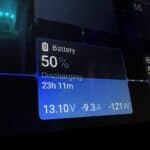
MENUMENU
TALK TO AN EXPERT
Special Hours: 7AM – 6PM PST
TALK TO AN EXPERT
Special Hours: 7AM – 6PM PST
Like other vehicles, boats use electrical systems to operate. Some have simple low-voltage needs like a car, while others need more complex, fully-featured power systems. How do these boats get this electricity? In this article, we discuss marine electrical systems, including how they work, the different parts, and a few safety tips you need to know about. Let’s get started!
A marine electrical system powers everything on your boat. What it powers and how big and complex a system depends on the size and type of your boat. Some systems will have a starting battery and perhaps a small house battery to power an electric trolling motor, radio, and GPS. Other systems can power all the livable amenities of a massive superyacht.
Ultimately, what you can power with your electrical system will depend on how many watts your system generates. Also, factor in the capacity of your batteries, the size of your inverter, and how much space you have to house the system.
A marine electrical system has several different parts for energy sourcing, storage, and conversion. Let’s take a look at the most common components you’ll find on a boat.
When it comes to actually generating electricity, some systems will have solar panels, wind generators, a carbon fuel generator, and or all of the above. This is the part of the electrical system that creates the energy in the first place. Solar is a fantastic option for marine electrical systems. Unlike on an RV, shade and other obstructions won’t cover your panels. They’re also relatively lightweight, especially flexible panels, and virtually maintenance-free.
Because many boats are frequently in windy conditions, particularly sailboats, small wind generators are a popular power generator option as well. Wind generators, however, make some noise and can put vibrations into the vessel that some find annoying.
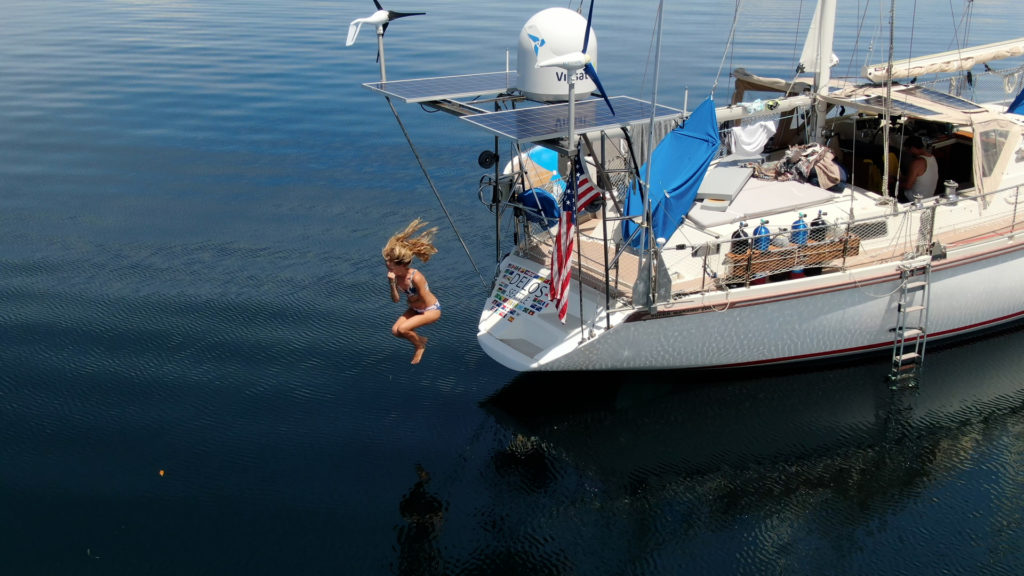
Carbon fuel generators, on the other hand, provide a backup electricity source for rainy days. They use some sort of fuel source, such as gas, propane, or diesel. From this, they generate AC electricity. This allows you to plug-in devices as though you had connected to shore power, as well as charge batteries.
Both solar panels and generators are rated by the number of watts they produce. Therefore, it’s important to understand how many watts your electronics will draw and how much energy your batteries can store. This lets you get the most out of your boat’s electrical system.
In order to store all the electricity your solar panels and/or generator creates, you’ll need a good battery system. Without good batteries, solar and wind will not work and a generator will be very inefficient. Batteries are the heart of any off-grid power system. There are actually two types of batteries that are important for a marine electrical system: the engine battery and the house batteries.
The engine battery really only has one job: starting the engine by cranking and creating a spark. It can also power simple electronics like radios and clocks. The engine battery will most likely be a lead-acid battery or another battery specialized for starting an engine repeatedly. Using this battery for other uses is not a good idea as it leaves you prone to damaging or draining the battery which is critical to get you moving again. Because of this other power needs are handled by the “house” batteries.
The house batteries are deep-cycle batteries that power all of your electricity needs. This includes a trolling motor, microwave, toaster, lights, TV, and whatever else you have on board. Lithium batteries are by far the best for this job as they’re much more energy-dense. They can also charge and recharge more often without suffering damage. And they’re maintenance-free!
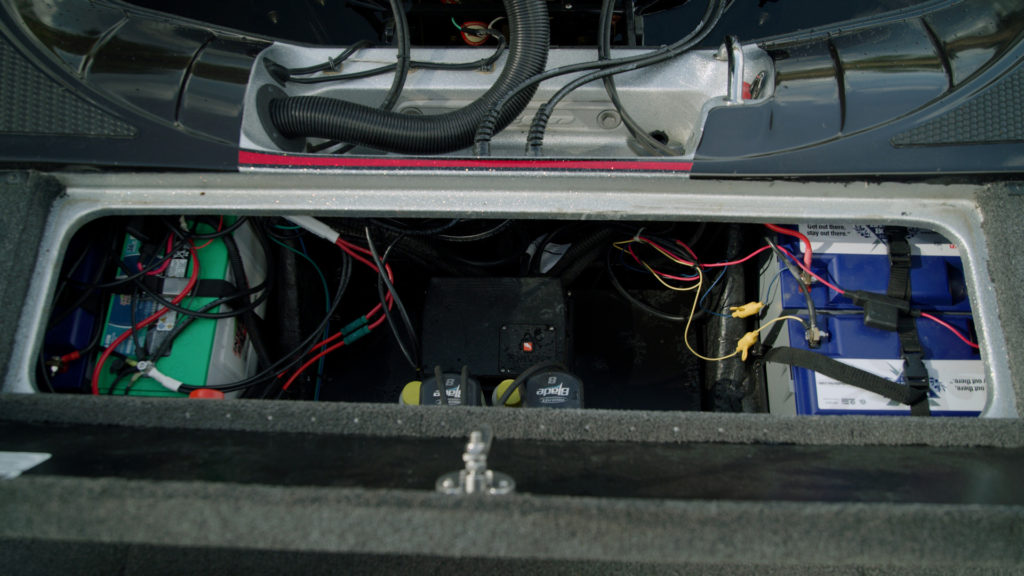
Inverter chargers are how AC electricity gets to and from the battery. AC power is the same type of power you have in your house, but batteries are low voltage DC so it needs to be converted. They can charge from AC power and also convert the battery’s DC electricity to AC electricity so you can use your outlets and devices as you would if you had plugged into shore power.
Other charger types may be needed as well to charge the battery using the DC electricity from the solar panels or wind generator.
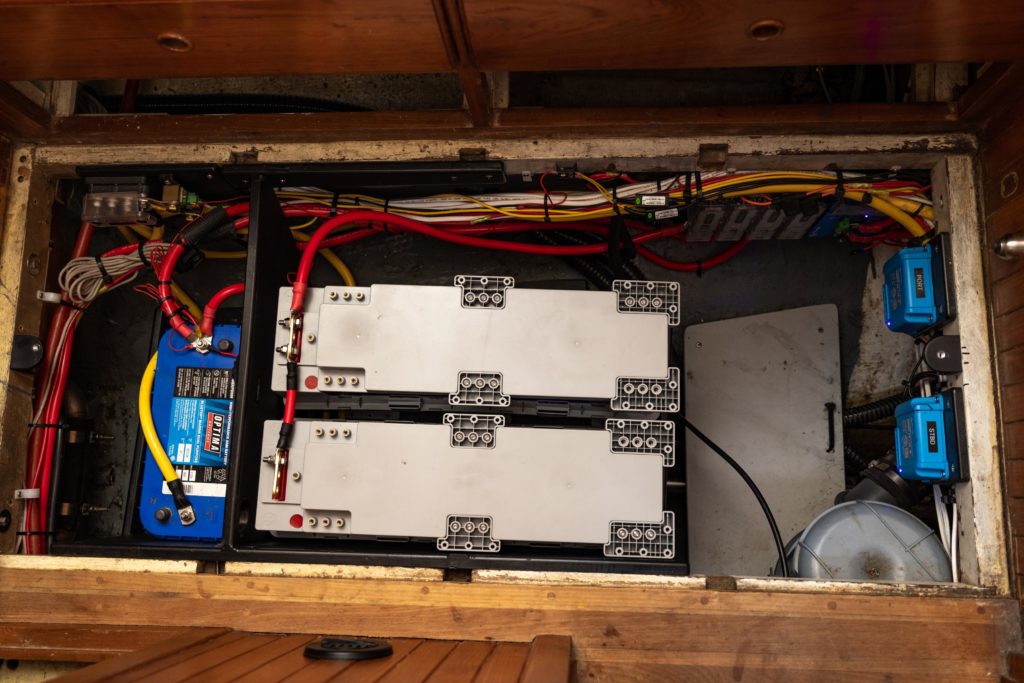
This brings us to the difference between DC and AC power. DC stands for direct current, meaning the electrons are only flowing one way through the wires. Unlike a generator, your solar panels will create DC electricity. Moreover, you can only store DC electricity. This is why it’s housed in your batteries and why you need an inverter to convert it into AC electricity. You can only use devices designed to run off DC without an inverter. These devices will likely say 12V on them.
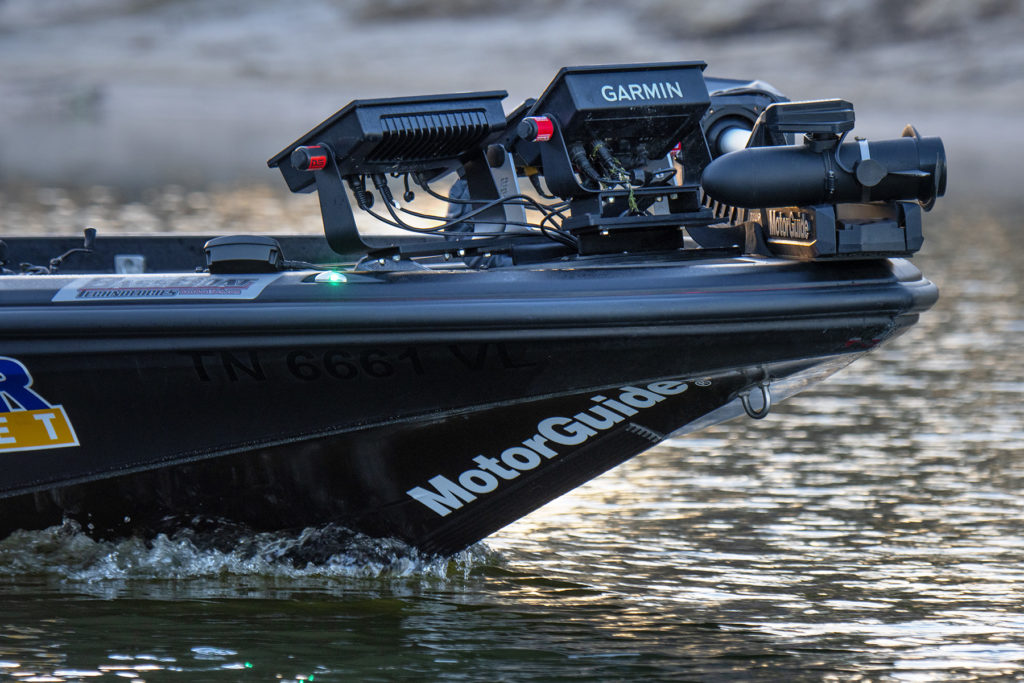
In comparison, AC stands for alternating current. This means that electricity can flow in both directions through the wires. The mainstream electrical grid uses AC power because it can be transported over long distances. Therefore, when you plug into shore power, you’re using AC electricity. Your generator also creates AC power. However, if you want to use the electricity from your solar panels or battery bank to power your entire electrical system, you’ll need an inverter that transforms DC electricity into AC electricity.
When you connect to shore power (i.e., AC electricity from a pedestal at a dock or a marine battery charger), the power charges your batteries and runs your appliances. To charge your batteries, you need to convert the AC power to DC power through a converter or battery charger. You can run your appliances and devices as you normally would when plugged into shore power.
When you’re not connected to shore power, your boat will need to generate its own power. This is where your solar power and/or generator come into play. The watts from your solar panel, generator, or boat engine will run through the wires to the converter and charge your batteries. Then, when you need to run an appliance, the electrons will move from your battery bank through the inverter to your outlets. This is how marine electrical systems work both on and offshore.
Not all boats have the same electrical system. Some smaller boats only run off DC power. This means they likely have one or two house batteries to power 12V systems. There is really no need for an AC electrical system in this case.
In comparison, larger boats such as yachts or catamarans will usually have a house electrical system in addition to the DC power system. To power these crafts fully, you’ll need AC power. You can achieve this by plugging into shore power directly or using a large enough inverter with your house battery system. You can also use your generator to create AC power, but this option isn’t typically feasible for long-term use.
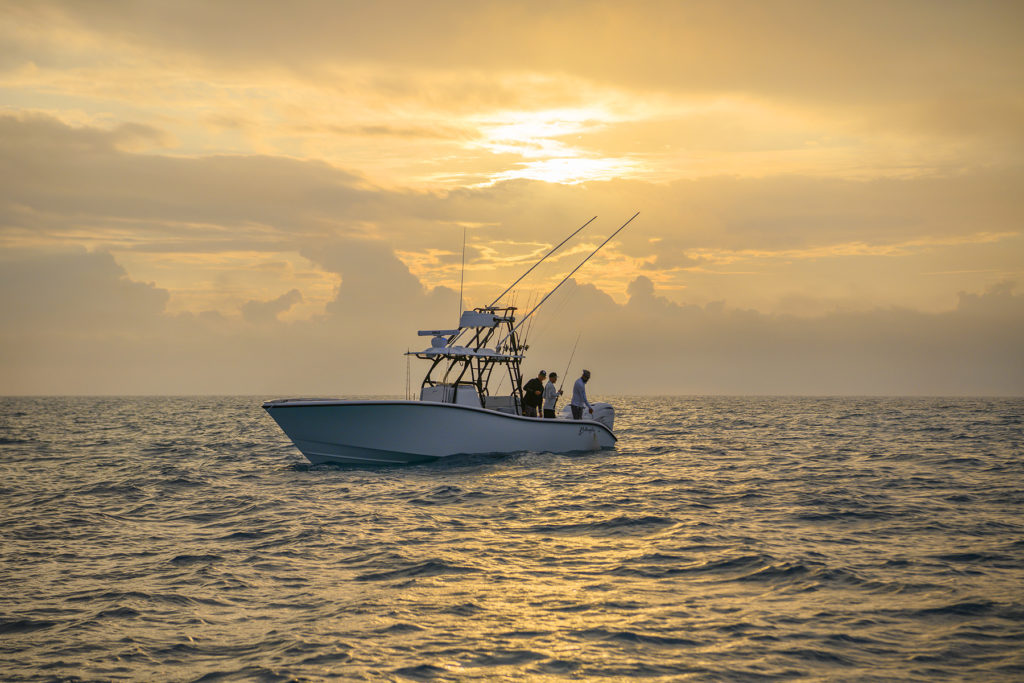
For your starting battery, we recommend going with the manufacturer’s suggestion. They’ll know which type of battery will work best with your boat’s engine.
For your house batteries, however, we recommend choosing lithium marine batteries like our high-quality Battle Born deep cycle lithium batteries. This is because they’re at the forefront of battery technology and have countless benefits compared to lead-acid batteries. For one, lithium batteries are the most energy-dense batteries on the market right now. Thus, you can store much more energy without taking up as much space or weighing down your boat.
Moreover, lithium batteries last longer than their lead-acid counterparts simply because their charge and discharge cycles are so much more efficient. They also charge quicker, have no maintenance requirements, and are much safer. Without a doubt, lithium is the way to go.
→ Learn more about How To Choose The Best Marine Battery for Your Boat
As you probably know, water and electricity should never mix. Therefore, it’s important to take safety precautions when dealing with your marine electrical system.
First and foremost, you should invest in an outlet tester and voltage tester. The outlet tester will allow you to check the safety of an outlet before you plug your boat into shore power. Moreover, a voltage tester allows you to detect any electric currents without touching the object. This can be especially helpful if you feel your boat may have “hot skin” and want to make sure it’s safe.
Additionally, you should always turn off all of the breakers at the shore power pedestal before plugging in your boat and only turn them on once you’ve securely inserted the plug. Make sure to plug in your boat using one hand, and don’t hold onto another object with the other. This will minimize the impact of the electrical current if you do get shocked.
Lastly, always use a Battery Management System (BMS) or purchase high-quality batteries with one built-in for your lithium batteries. BMSs ensure your batteries remain at the right temperature and discharge properly. They also prevent them from overcharging and causing a potentially dangerous reaction called thermal runaway.
Battle Born Batteries have an internal BMS already installed and quality control tested before leaving our Nevada manufacturing facility.
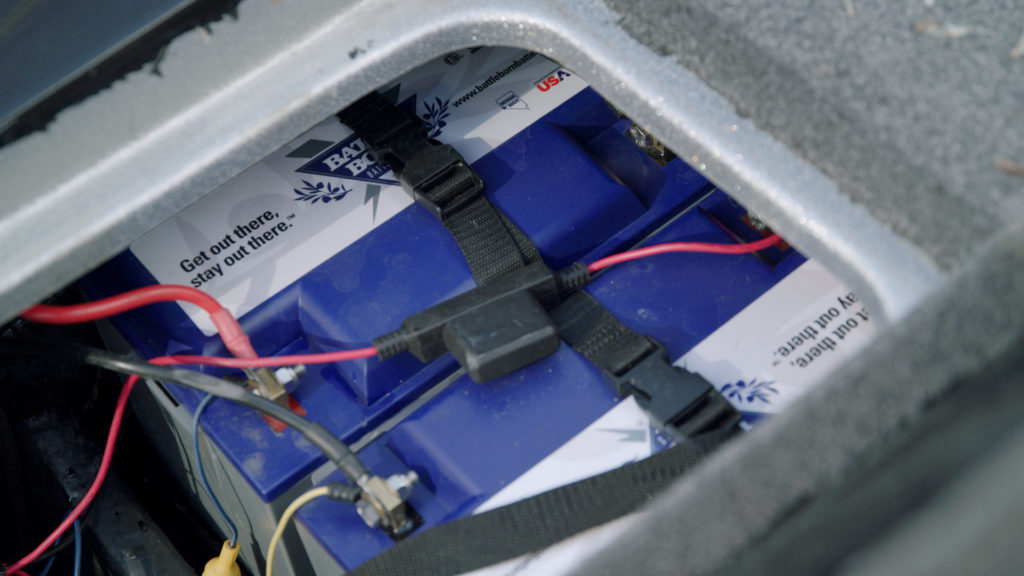
Your boat’s electrical system is crucial to your safety and wellbeing. Major problems can occur if it’s wired incorrectly, plugged into a faulty outlet, or malfunctioning. These include the risk of electric shock, an electrical fire, and massive damage to your electrical system. Because of this, we recommend hiring a professional for your marine electrical system needs. You may have to spend more money upfront, but you’ll have peace of mind knowing everything is running as it should.
Do you have any comments or questions about your boat’s electrical system? Leave them in the comments below!
We know that building or upgrading an electrical system can be overwhelming, so we’re here to help. Our Reno, Nevada-based sales and customer service team is standing by at (855) 292-2831 to take your questions!
Also, join us on Facebook, Instagram, and YouTube to learn more about how lithium battery systems can power your lifestyle, see how others have built their systems, and gain the confidence to get out there and stay out there.
Shop Best Sellers








Ask a technical specialist now at 855.292.2831
Stay in the Know